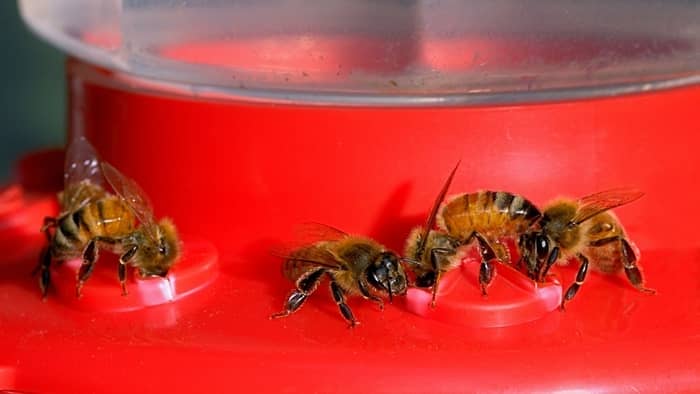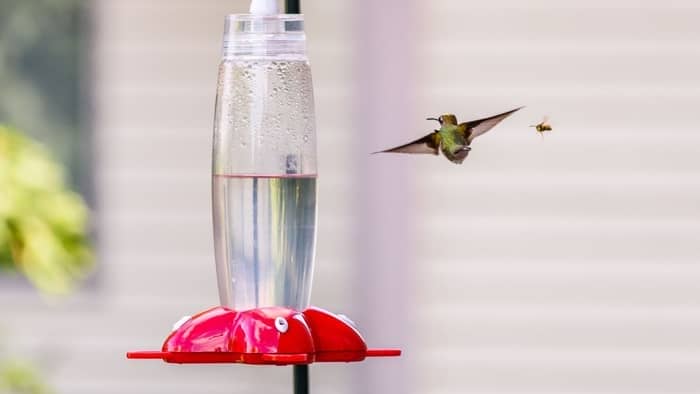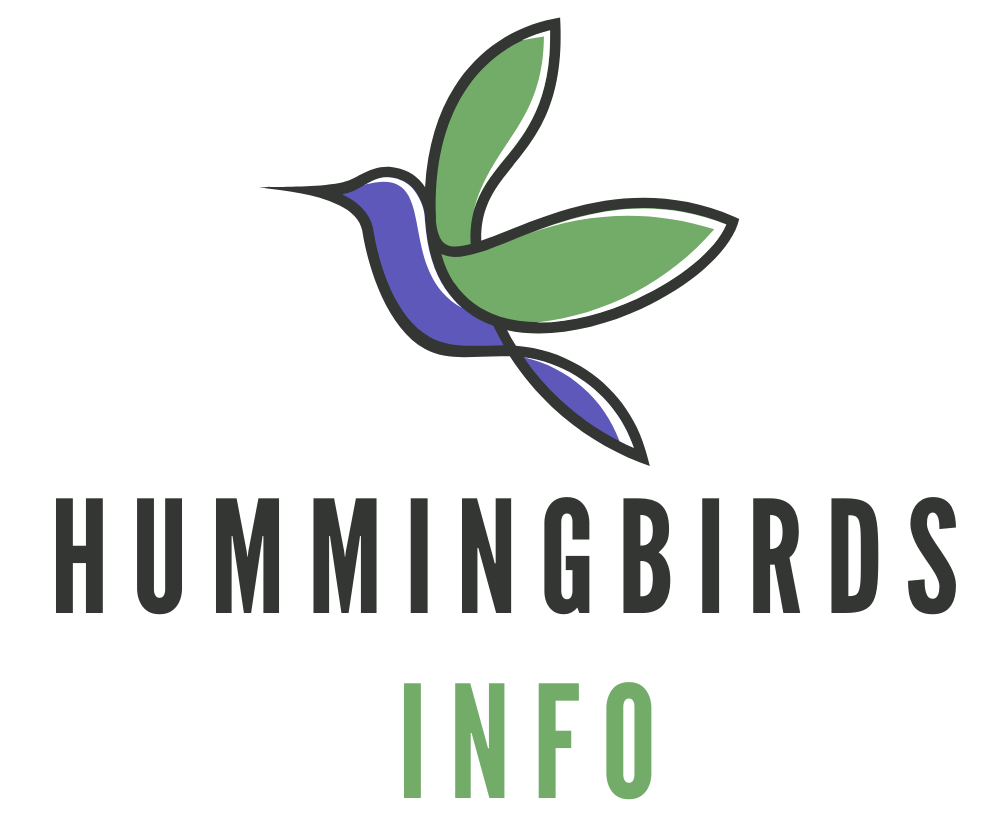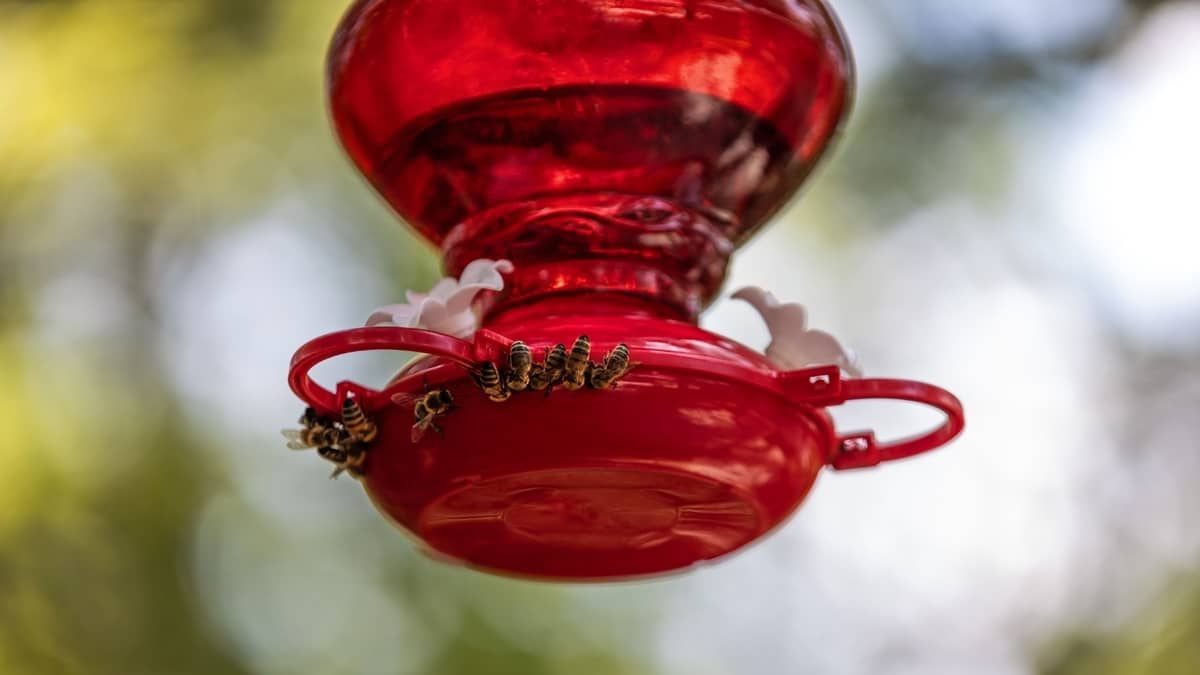Are bees taking over your hummingbird feeder and you’re wondering how to resolve this issue? It can be pretty frustrating dealing with bees and other flying insects disturbing your feeders. But what can you do about this?
Taking preventive measures to avoid bees’ invasion of your feeder is the first thing to put in mind. However, if bees do end up finding your hummingbird feeders, there are still things you can do to eliminate them.
We’ve got some great tips to help you deal with bees taking over your hummingbird feeder. So, let’s look into this.
Do Hummingbird Feeders Attract Bees?
Hummingbird feeders definitely attract bees because these bees also love to feed on sweet nectar. There are also other types of insects that may be attracted to hummingbird feeders and they include hornets, wasp, ants, and so on. These are the most common uninvited guest you may find on your hummingbird feeders.
Bees Taking Over My Hummingbird Feeder
Hummingbirds love to feed on sweet nectars but other flies such as bees also love to feed on nectar. Apart from bees or wasp, you may even have to deal with other bees’ varieties such as hornet, yellow jacket, and others.
A couple of bees feeding on your hummingbird feeders aren’t so bad. Bees are known to be beneficial to gardens as they help with pollination. However, when bee invasion becomes too much on your hummingbird feeders, it usually calls for concern.
Too much feeder invasion from these bees will make feeders look unattractive to these birds thereby discouraging hummingbirds and force them to abandon your feeder. This in turn reduces the number of these lovely birds visiting your vicinity.
Keeping Bees Off Hummingbird Feeder
Bees on hummingbird feeders always worry birders because too much invasion can discourage hummingbirds to stop feeding on the bee invaded feeder. This will in turn reduce the population visit of hummingbirds to your vicinity and you may not get to experience these lustrous birds in your garden.
This is why we need to learn ways we can keep bees off our hummingbird feeders and enjoy these charming birds hover around our garden.
How To Get Rid Of Bees On Hummingbird Feeders

There are various ways to eliminating or keeping away bees and other annoying insects from your hummingbird feeder. However, have in mind that total or 100% elimination of these insects may be possible.
A few insects visiting your feeders isn’t all that bad because both hummingbirds and bees can share companions. But if you have an invasion of these insects, there are steps to take to reduce their invasion considerably.
Below are ways to keep bees as well as wasps from your feeder.
How To Keep Bees And Wasps Away From Hummingbird Feeders
Firstly, we advise you not to use pesticides or insecticides for eliminating bees or ants as this can be harmful to hummingbirds. Pesticides will definitely kill insects such as bees, wasps, spiders, and so on.
However, keep in mind that hummingbirds do feed on these insects and spiders. So, you may end up poisoning hummingbirds when they feed on the insects you’ve sprayed with pesticides.
Follow these safe ways to keep bees away from your feeders:
1. Maintain a clean feeder
Bees really love sugar and they will go after sweet hummingbird feeders. While sweet nectars are in a sealed enclosed feeder, if any spillage should occur whenever you refill the feeders, it can cause some problems.
Therefore, avoid any spillage when refilling and if any leak does occur, clean thoroughly and clean any spills around the feeder location and on the ground.
The hummingbird feeder should be wiped at least once daily. If any drip lingers for too long on your hummingbird feeders, it can attract these bees and other insects to feed on the nectar.
2. Avoid leaky feeders and use Bee resistant hummingbird feeders
Some feeders may be of low quality and may end up leaking when exposed to some elements such as heat. Therefore, ensure you use quality or standard feeders.
Use saucer type of feeders which has a bowl of sweet nectar and these birds can easily reach them by sticking out their bills to reach for some nectar. These hummingbird feeder saucers have covered over their head and these birds can reach their nectar using their long bill and tongue. Hence, these are feeders are resistant to bees. So bees will find it difficult to reach the sweet nectar.
3. Hummingbird feeders with bee guards
If you’re still having issues with bee invasion, you can simply add nectar guards to your hummingbird feeder. A nectar guard is a small flexible plastic that is usually attached to the feeding port. It fits over the feeding port thereby preventing ants from climbing and keeping bees away. The hummingbirds are still able to reach out to the nectar.
The bee nectar guards are usually handy or useful for vacuum-style feeders. Saucer-type feeders don’t usually require bee guards.
The feeder you purchase may come with nectar or bee guard already installed. However, other feeders may require you purchase these bee guards for the feeder model you already have.

4. Use red rather than yellow decorated feeders
Wasps and bees are said to be enticed by the yellow color rather than red. These insects relate the color yellow with pollen. Hence, they will tend to fly towards the color. Therefore, ensure you go for feeders only decorated with red and avoid yellow colors.
5. Move feeding station
Sometimes, all you need do is to simply relocate or move your feeders to another spot. It is more likely for insects to give up the search for relocated food sources. But so far you’ve made your vicinity a good spot for hummingbirds to get reliable food sources, they will keep visiting and will find your relocated feeders.
The bees may still move around looking if the food source is still close by. But if they end up not finding it, they will usually give up their search and you would have succeeded in tricking them.
Also, we recommend you move or position your feeders to a shaded location. Avoid direct sunny spots because bees love to stay in a sunny spot. Positioning your feeders in a shaded spot will also help maintain a fresh and long-lasting nectar solution.
Just ensure the shaded space is not too covered for hummingbirds to locate and also hover around while they feed.
6. Multiple food sources
You can simply distract bees by hanging multiple feeders in your garden. Provide another food source for the bees and entice them to that spot away from the feeders meant for hummingbirds. You should use feeders decorated with yellow that bees can’t resist.
You should also plant flowers that bees can’t resist. These bees will love this natural food source you’ve provided for them thereby reducing their invasion of your feeders. You can also add flowers that will attract hummingbirds and serve as an extra food source for them.
Bees Taking Over My Hummingbird Feeder: Conclusion
Bees taking over your hummingbird feeder can really give hummingbird lovers a tough time. Bee invasion can discourage hummingbird’s visit to your garden and you may end up not having enough visits from these remarkable birds. The good news is there are things you can do to keep them away from your feeders.
We’ve listed some tips on how you can keep bees and wasps away from your hummingbird feeders. So follow our tips to enjoy great results.
Read more about How To Attract Hummingbirds In Florida

